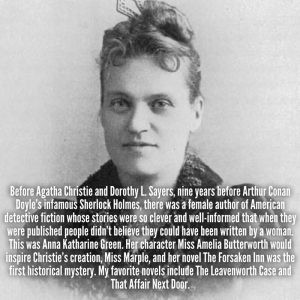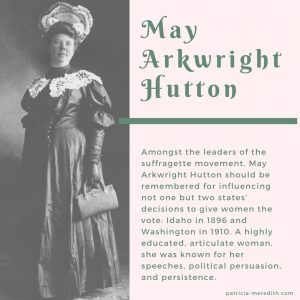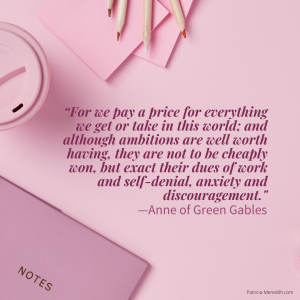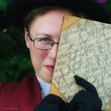Patricia Meredith's Blog, page 13
October 7, 2020
How Much History is Too Much History?

What does a writer of historical fiction have in common with a writer of epic fantasy?
How much history is too much history?
It’s the same dilemma for both writers, oddly enough. For the epic fantasy writer (like my husband, Andrew Meredith), there’s always the question of spending too much time describing the world, and not enough character or plot development. For the historical fiction writer, we don’t have to create the world, but we do have to research the world as it was, and deftly introduce the reader to a past which seems almost fantastical sometimes to modern sensibilities.
One may have to research first-person accounts from the time period, and the other might have to make up the backstory, but really both have to eventually answer the question: What to include?
I may spend a full week hunting down whether in 1901 people used the phrase “dollars to donuts” while my husband may spend a full week coming up with the idioms found in a water-based culture. I may spend a happy hour reading through old newspapers only to realize at the end I’ve wasted just as much time as my husband has done figuring out the weather patterns for a world with two moons.
Connie Willis, my favorite author of all time, has actually written historical fiction books on either end of the spectrum. On one hand you have To Say Nothing of the Dog, which is more like a hilarious romp through the 1800s, complete with romance, witty banter, enough literary references to please the most intellectual bibliophile, and a plot that can really only be described as: “A time travel historian gets sent back to Victoriana to relax—mayhem ensues.”
It’s apparent Willis went to a lot of trouble to capture the unique nature of the people, places, and things of the era (I now know what a pen-wiper is, for example), while showing that really, when it comes down to it, none of these things have changed much in over a hundred years.
On the other hand, you have her Blackout and All Clear two-part series, which has so much historical detail I imagine the publishers told her she’d either have to cut enormous swathes out of the story or she’d have to divide the book in two rather than selling it as a single volume. Obviously, she chose the latter.
She must have spent years delving into every little nuance of WWII culture, and not just in London or just for the life of a shop girl, no, she covers everything from the Battle of Dunkirk to child refugees to nurses on the frontlines. I seriously cannot fathom the amount of time and effort she must have put into her research, and the pay-off is astounding.
So ultimately, when it came time for me to write my historical mysteries, I kept returning to this pendulum swing, struggling desperately to find where on the parabola I would stake my claim. For in the end, an author just has to pick where they want to be and stick to it.
More than anything, consistency is key. You’ll always have readers who prefer one end to the other. And like all things in publishing, you can’t make everyone happy. No matter what, you’ll have someone who’s not happy with you, whether it’s the reader who prefers a couple vampires running around their historical locales or the reader who’d rather you didn’t make up people when there are perfectly wonderful people who’d do just as well actually inhabiting history.
In the end, you have to ask yourself: What do I want to read?
So where have I ended up? Somewhere between To Say Nothing of the Dog and All Clear. I’ve attempted to stay closer to the “true history” side of things, incorporating as many real people, events, and locations as possible to try for that jolt of recognition. I’ve even tried to keep the language and phrases used in both dialogue and exposition strictly to those said and used in 1901 and before (I’m a bit of an etymology buff now).
But, for purposes of my book, The Butcher, the Baker, the Candlestick Taker, I’ve also introduced a full cast of characters that only exist in the 1901 Spokane in my head. And for my novel about Anna Katharine Green, only a few of the characters are made up, far more of them actually coming straight out of history.
I encourage readers to seek out those true elements found in my books, in addition to the ones listed in the appendix in the back. I had fun incorporating them, and look forward to many more research journeys into the annals of Spokane and Anna Katharine Greens’s histories.
Where do you lie on the incorporated history spectrum?
The post How Much History is Too Much History? appeared first on Patricia Meredith, Author.
September 1, 2020
Reading: Agatha Christie’s Autobiography

I’m afraid I don’t have much to add to the brilliance that is Agatha Christie’s autobiography. Instead, I’ll be sharing some of my favorite quotes from my reading, particularly those pertaining to writing. I hope they encourage and inspire you as they have me!
“The whole point of a good detective story was that it must be somebody obvious but at the same time, for some reason, you would then find that it was not obvious, that he could not possibly have done it. Though really, of course, he had done it.”
“You start into it, inflamed by an idea, full of hope, full indeed of confidence (about the only times in my life when I have been full of confidence). If you are properly modest, you will never write at all, so there had to be one delicious moment when you have thought of something, know just how you are going to write it, rush for a pencil, and start in an exercise book buoyed up with exaltation. You then get into difficulties, don’t see your way out, and finally manage to accomplish more or less what you first meant to accomplish, though losing confidence all the time. Having finished it, you know that it is absolutely rotten. A couple of months later you wonder whether it may not be all right after all.”
“I wrote quite a lot of poems from time to time. A sudden excitement would come over me and I would rush off to write down what I felt gurgling round in my mind.”
“Like all young writers, I was trying to put far too much plot into one book. I had too many false clues–so many things to unravel that it might make the whole thing not only more difficult to solve, but more difficult to read.”
“I myself always found the love interest a terrible bore in detective stories. Love, I felt, belonged to romantic stories. To force a love motif into what should be a scientific process went much against the grain. However, at that period detective stories always had to have a love interest–so there it was.”
“When one starts writing, one is much influenced by the last person one has read or enjoyed.”
“I had had some nice reviews for The Mysterious Affair at Styles, but the one which pleased me best appeared in The Pharmaceutical, Journal. It praised ‘this detective story for dealing with poisons in a knowledgeable way, and not with the nonsense about untraceable substances that so often happens. Miss Agatha Christie,’ they said, ‘knows her job.”
“I never approached my writing by dubbing it with the grand name of ‘career’. I would have thought it ridiculous.My mother-in-law could not understand this. ‘You write so well, Agatha dear, and because you write so well, surely you ought to write something–well–more serious?’ Something ‘worth while’ was what she meant. I found it difficult to explain to her, and indeed did not really try, that my writing was for entertainment.”
“Some of my books satisfied and pleased me. They never pleased me entirely, of course, because I don’t suppose that is what one ever achieves. Nothing turns out quite in the way you thought it would when you are sketching out notes for the first chapter, or walking about muttering to yourself and seeing a story unroll.”
“I never had a definite place which was my room or where I retired specially to write. This has caused much trouble for me in the ensuing years, since whenever I had to receive an interviewer their first wish would always be to take a photograph of me at my work. ‘Show me where you write your books.’‘Oh, anywhere.’‘But surely you have a place where you always work?’But I hadn’t. All I needed was a steady table and a typewriter. I had begun now to write straight on to the typewriter, though I still used to do the beginning chapters and occasionally others in long-hand and then type them out. A marble-topped bedroom washstand table made a good place to write; the dining-room table between meals was also suitable.”
“I must behave rather as dogs do when they retire with a bone: they depart for an odd half hour. They return self-consciously with mud on their noses. I do much the same. I felt slightly embarrassed if I was going to write. Once I could get away, however, shut the door and get people not to interrupt me, then I was able to go full speed ahead, completely lost in what I was doing.”
“Plots come to me at such odd moments: when I am walking along a street, or examining a hat-shop with particular interest, suddenly a splendid idea comes into my head, and I think, ‘Now that would be a neat way of covering up the crime so that nobody would see the point.’ Of course, all the practical details are still to be worked out, and the people have to creep slowly into my consciousness, but I jot down my splendid idea in an exercise book.So far so good–but what I invariably do is lose the exercise book. I usually have about half a dozen on hand, and I used to make notes in them of ideas that had struck me, or about some poison or drug, or a clever little bit of swindling that I had read about in the paper. Of course, if I kept all these things neatly sorted and filed and labelled it would save me a lot of trouble. However, it is a pleasure sometimes, when looking vaguely through a pile of old note-books, to find something scribbled down, as: Possible plot–do it yourself-Girl and not really sister–August—with a kind of sketch of a plot. What it’s all about I can’t remember now; but it often stimulates me, if not to write that identical plot, at least to write something else.Then there are the plots that tease my mind, that I like to think about and play with, knowing that one day I am going to write them. Roger Ackroyd played about in my mind for a long time before I could get the details fixed.”
“When I began writing detective stories I was not in any mood to criticise them or to think seriously about crime. The detective story was the story of the chase; it was also very much a story with a moral.”
“One of the pleasures of writing detective stories is that there are so many types to choose from: the light-hearted thriller, which is particularly pleasant to do; the intricate detective story with an involved plot which is technically interesting and requires a great deal of work, but is always rewarding; and then what I can only describe as the detective story that has a kind of passion behind it–that passion being to help save innocence. Because it is innocence that matters, not guilt.”
“This seems to have taken me a long way from detective stories, but explains, perhaps, why I have got more interest in my victims than my criminals. The more passionately alive the victim, the more glorious indignation I have on his behalf, and am full of a delighted triumph when I have delivered a near-victim out of the valley of the shadow of death.”
The post Reading: Agatha Christie’s Autobiography appeared first on Patricia Meredith, Author.
August 4, 2020
Forgotten Females

Did you know: 100 years ago women’s right to vote came to fruition with the passing of the 19th Amendment! Of all years, this year in particular it seems especially important for women to use this right.
Two years ago, in honor of Women’s History Month, I tweeted a series of posts about Forgotten Females of History. I’d like to share those posts again here, collected together, for those who are interested…
Anna Katharine Green

Before Agatha Christie and Dorothy L. Sayers, nine years before Arthur Conan Doyle’s infamous Sherlock Holmes, there was a female author of American detective fiction whose stories were so clever and well-informed that when they were published people didn’t believe they could have been written by a woman. This was Anna Katharine Green. Her character Miss Amelia Butterworth would inspire Christie’s creation, Miss Marple, and her novel The Forsaken Inn was the first historical mystery. My favorite novels include The Leavenworth Case and That Affair Next Door.
Mother Joseph of Sacred Heart

Spokane was in need of a real hospital, and Mother Joseph was the nun to lead the charge. After traveling across country collecting donations for the endeavor, she bought the necessary land, oversaw construction, maintained high standards, and succeeded in delivering “one of the most perfect buildings from the point of utility ever constructed” (Spokane Falls Review). Mother Joseph is inspirational in her determination and belief that God would provide—just look at what she accomplished!
May Arkwright Hutton

Amongst the leaders of the suffragette movement, May Arkwright Hutton should be remembered for influencing not one but two states’ decisions to give women the vote: Idaho in 1896 and Washington in 1910. A highly educated, articulate woman, she was known for her speeches, political persuasion, and persistence.
Elizebeth Friedman

Over the course of two world wars, Elizebeth Smith Friedman used her incredible skills in cryptology in support of Allied Forces against the Nazis, including the cracking of multiple versions of the Enigma machine. An expert in Shakespeare, her language skills became valuable in the new field of code-breaking. Although her husband went down in history as the father of cryptology, Elizebeth’s skills—which were just as, if not more, skilled than her husband’s—were forgotten… If you’d like to learn more about her I strongly recommend The Woman Who Smashed Codes by Jason Fagone.
The post Forgotten Females appeared first on Patricia Meredith, Author.
July 14, 2020
The Query Question

I recently had a friend ask me how I got my agent with the idea being that she also would like to pursue publication. But when I started explaining, her eyes glazed over and she got that funny twitch in the corner of her mouth that people get when they’re like, “Are you kidding me??”
It occurred to me that I remember thinking when I was at that point that I wish someone would just sit down and explain the process step-by-step for me. Guess what? It’s your lucky day because I’m going to do that now for you! 
July 1, 2020
Escapades of a Spokane Thief
I’m trying something new! If you subscribe to my newsletter right now, you’ll receive a free copy of my short story “Escapades of a Spokane Thief” set in 1901 Spokane!
This short story actually began life as the prologue to my book The Butcher, the Baker, the Candlestick Taker. I thought it’d be fun to share with you this fun little adventure that started things off.
What makes this story even more fun, in my opinion, is that it was inspired by a real article from The Spokane Falls Review:

“Talking about prisoners jumping through car windows to get away from their keepers,” remarked an old sheriff, as he kept his eye on two men who were handcuffed together and occupied the seat in front of him, “let me tell you a little story. About fifteen years ago I was taking a chap up to Joliet one night and as I always thought myself good enough for any one man, and, as he was a quiet one, anyhow, I took the clamps off him. I had had him in charge several months, and I thought him a big coward; so when he asked permission to go into the closet I let him go, feeling confident he would never jump with the train going forty miles an hour. “He didn’t come back directly, and then I got scared and looked for him. The window of the closet was wide open, and it was too plain he had made the jump. I stopped the train and we ran back, got out lanterns and looked for him. I expected to find him dead by the side of the track, but not a sign of him did we discover, except that I found his hat where he had jumped. The train went on and I stayed there, swore in a posse from among a lot of section hands, and offered a reward. But I never found him—not even a track nor a sign, save that hat. It was always one of the greatest mysteries to me how he got away. The fall must have hurt him as there was a high bank there, and how a man could get away so quick after such a terrible jump was more than I could understand. “Ten years afterward I came across that man in the pen in Joliet, where he was a ten-year burglar. He told me how he had got away, and laughed so over it that I’ll bet the day he got a chance to tell me of his cleverness was the brightest one he had passed in many a year. He had simply climbed out the window, reached up to the ventilators with his hands, and pulled himself up to the top of the coach. There he lay and heard us talk about catching him. When the train went on with him and without me, he was very happy. As soon as he got a chance at one of the stations he jumped upon a freight train, and from that out was nothing but a common tramp. Pretty slick, wasn’t it?”
—Spokane Falls Review, Feb 21, 1885, “How the Prisoner Escaped” (Chicago Herald “Train Talk”), page 3, column 5
In my book, I often found inspiration from real-life articles from the local newspapers. To the point of being dragged down rabbit holes of research that were far too fun to ignore. 
June 16, 2020
Reviving My Blue Flame

I mentioned in my last post that I’ve been having trouble finding the energy to write, and it finally occurred to me that maybe what was holding me back (outside of quarantine stress) was this feeling like I couldn’t just write whatever gave me joy, which right now might not be mystery.
It was then I picked up Jennifer Fulwiler’s INCREDIBLE new book, Your Blue Flame, and she spoke directly to me (through the words on the page, of course 
June 2, 2020
Writing During Quarantine

As an introvert, I recharge with time alone. So I have to admit, when Quarantine hit, hearing that all required social events were canceled made my little introvert heart soar with happiness.
Fast forward six or seven (or has it been eight?) weeks…
I’ve been spiraling through cycles of depression and mood swings like crazy the past several weeks. With each new announcement, I’d bounce again between “you’ve got to be kidding me” and “well, I saw that one coming.” The hardest part, however, has been finding the gumption within to write.
Writing is very important to me. I’m not published yet, but as my agent keeps saying, we need to keep writing.
It’s so easy to see success as “wealth, favor, or eminence” (the Merriam-Webster’s definition of success). But to me, success is providing for my family’s basic needs. “Basic needs” to me include a happy heart, mind, soul, and body.

I have to remind myself frequently that my success doesn’t rely on the world’s success, but on God’s. And God gave me the kids I’ve always wanted so I could write with them, play stories with them, cook and bake with them, garden and explore with them, and homeschool with them the way I always dreamed.
I’ve known I wanted to be a writer since I was nine years old. Writing feeds my basic needs in a way that has nothing to do with the dictionary definition of success.
Writing makes my heart happy, my mind engaged, my soul entertained, and my body healthy. Writing itself is successful to me even before getting published or meeting the world’s level of success. (It reminds me of that quote from Little Women I shared a couple weeks ago.)
It wasn’t until a couple days ago that I finally realized part of the reason why I might be feeling down was because I hadn’t been writing.
Instead of waiting for the energy to write, perhaps I should write in order to find the energy.

I’ve had to learn that for me, writing gives me energy, but it may be a different type of writing than I expected (more on that later). So long as it is making me happy enough to give me the energy to do more, I should pursue it.
Just a little something to remind myself everyday, especially in the midst of this quarantine uncertainty…
How have you been coping?
The post Writing During Quarantine appeared first on Patricia Meredith, Author.
May 19, 2020
Listening vs Reading

I originally wrote this article before quarantine had started, but it’s only become more true given the world’s current circumstances. Listening to audiobooks is a wonderful way to pass the day. I myself much prefer listening to a book these days over reading them for several reasons.
I can listen while I work, be it folding laundry, washing dishes, gardening, or feeding animals. Because I can multi-task while listening, I’m accomplishing far more in chores, but also reading more books than I ever have before. As an added bonus, it makes the work go by much faster. I protect my eyes by limiting screen time and/or reading from a page in dismal lighting conditions late at night. I can listen during long car trips, which, as we live out in the country, every drive is a minimum of 30 minutes long, and that’s a decent length of book reading.
What’s more, all these benefits effect my children, as well. I have a six- and four-year-old at the moment, and we absolutely love to read together. My six-year-old can read to himself, but my four-year-old can only “read” those books she’s memorized. Although it is important for emerging readers to also see the written word, the benefits of listening to audiobooks are still applicable to them.
For example, they can listen while they play, perhaps doing a puzzle or building with Legos. They can also listen in the car, which I much prefer to the idea of letting them watch movies over long car trips. I grew up listening to audiobooks in the car, and those are still some of my favorite memories. There’s something very different and wonderful about listening to Hank the Cowdog and Anne of Green Gables in the car. Not to mention the fantastic radio theater productions one can find. My absolute favorite versions of The Chronicles of Narnia are the radio dramas produced by Focus on the Family.
There are a couple ways in which I think this rise in audiobook usage is impacting novel-writing, as well.
Writing style— With more books being listened to via audiobook, I think authors would be smart to pay greater attention to how their work sounds as much as reads. I’ve always heard it’s smart to read your book aloud at least once at some point during the revision process, and I think this advice is even more insightful these days than ever before. Length of books— I believe writers are becoming more aware of how long it takes for a narrator to read their book aloud, as this is a much easier thing to guesstimate than how long it might take any reader to read it to themselves. If you listen to a lot of audiobooks, you’ve probably noticed there’s an average cadence which makes the typical audiobook length about ten hours, at least the books I’ve been listening to. Collections of short stories achieve about the same length. Naturally, epic fantasy and older classics will always stretch the mold. Also, listening to a book at a higher rate (1.25 up to 2) will change this.
There are even some authors who’ve begun writing books that are only being produced via audiobook, which I think is a mindset that probably produces a writing style more like that of a script than a book, in some ways. The rise of audio drama podcasts, like Victoriocity (which I adore!), are also bringing a new format to the art of story-telling.
All this change is natural, of course, but it makes one wonder where it will lead? Will the audiobook dominate sales? Will it eventually mean people won’t need to learn how to read as everything will be read for us? Will required reading levels become something dependent upon one’s intended job?
What do you think?
The post Listening vs Reading appeared first on Patricia Meredith, Author.



